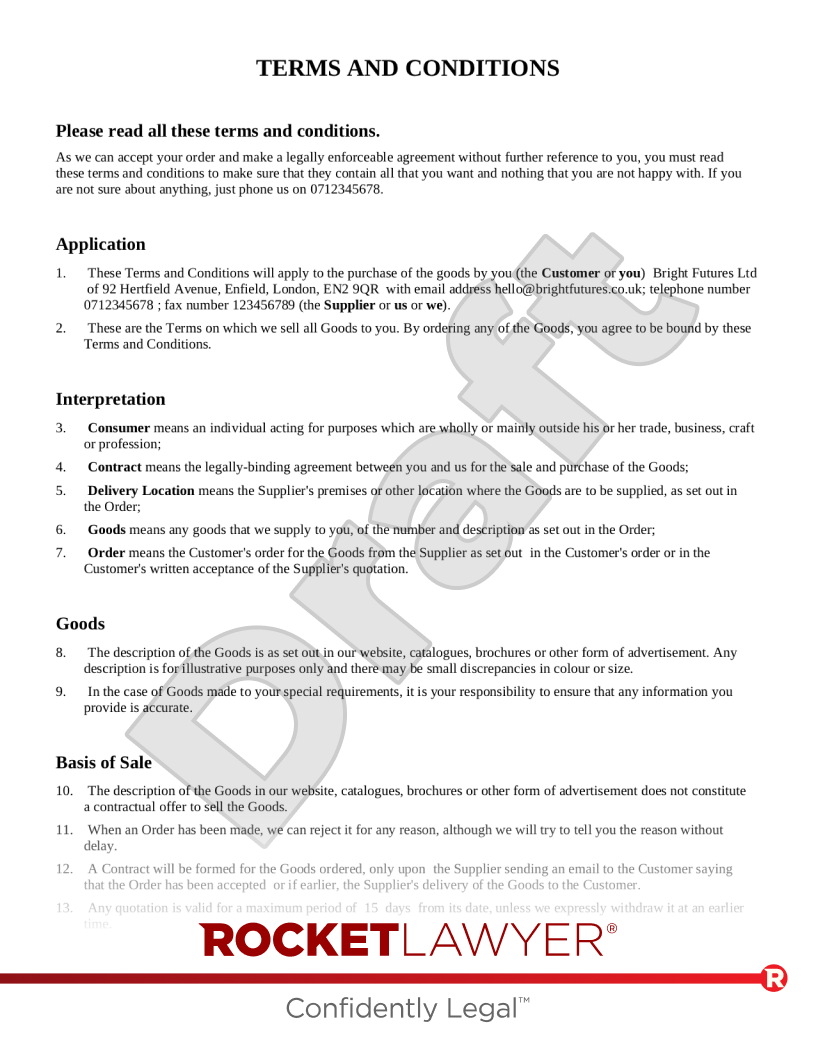Contracts with consumers
Consumers are customers who are purchasing goods or services as individuals (ie not for a business).
Businesses can use terms and conditions to set out the rules governing their transactions with consumers. These terms and conditions should cover all common terms that generally apply to transactions between sellers and their customers. This includes terms on payment, liability, and returning products. For terms and conditions to be legally binding in relation to a contract made for a sale, a seller must bring them to the attention of their customers before a contract is formed (ie before a sale is finalised), whether that be online or on-premises. For more information, read Terms and conditions and How to choose the right terms and conditions.
Businesses selling to consumers have to comply with more regulations than those selling purely to businesses. There are various laws which relate to doing business with consumers. These include requirements that contracts with consumers avoid onerous terms and do not exclude the seller's liability in certain ways. For more information, read Doing business with consumers, Consumer rights, and Supply of services B2C.
Business customers
Businesses that sell to other businesses (ie B2B businesses) can also use general terms and conditions to set out provisions that are commonly used in business-to-business transactions. Again, these terms and conditions must generally be brought to the attention of your customers before contracts are formed in order for these contracts to be legally binding.
If using general terms and conditions is not specific enough for a given sale, businesses can alternatively set out transactions in contracts such as Services agreements or Sales agreements. Using a specific agreement per transaction allows you to tailor relevant provisions to each transaction which may be necessary in a business-to-business environment. Such provisions may include terms relevant to payment, liability, confidentiality and intellectual property (IP).
Online customers
If a business wishes to engage in e-commerce (ie doing business online), it must comply with certain regulations including The Electronic Commerce (EC Directive) Regulations 2002 (the ‘Electronic Commerce Regulations’). They should also be aware of their duties under The Consumer Contracts (Information, Cancellation and Additional Charges) Regulations 2013. For example, certain information should be made available to customers. For more information, read Online business regulations.
Creating website terms of use (also called website terms and conditions) will help businesses comply with the Electronic Commerce Regulations. Website terms of use govern the use of a website by visitors and should contain various information such as details of the website's owner. For more information, read more about Website terms of use.
Online businesses that handle personal electronic data and use tracking cookies can reassure customers that their data will be protected by using a Website privacy policy.
Data protection considerations
All businesses should be aware of the Data Protection Act 2018, the UK General Data Protection Regulation (UK GDPR), and The Privacy and Electronic Communications (EC Directive) Regulations 2003. These are key pieces of legislation governing how individuals’ personal data (ie information about an individual from which they may be identified) can be used within the UK, including during business transactions.
Businesses processing their customers' personal data must ensure that the data is:
-
used fairly, lawfully and in a transparent manner
-
collected for specified, explicit and legitimate purposes
-
adequate, relevant and collected only to an extent that is necessary
-
accurate and kept up-to-date
-
kept in a form that enables identification of data subject rights for no longer than is necessary;
-
handled according to the data protection rights of individuals;
-
kept secure and not transferred outside of the European Economic Area (EEA) without adequate protection
Businesses that collect and process personal data must pay the Information Commissioner’s Office (ICO) a data protection fee unless they are exempt.
For more information, read Data protection, Data protection principles, Data privacy and cookies, and Processing personal data.
Subscription contracts
Subscription contracts are those that automatically renew and the customer incurs fees until they actively end the contract. The Digital Markets, Competition and Consumers Act 2024 will introduce new rules protecting consumers when they enter into a consumer contract. These rules are expected to take effect in 2026. The new rules will require businesses to, when making subscription contracts with consumers:
-
provide adequate pre-contract information, including:
-
details allowing the consumer to understand the nature of the contract
-
whether there might be future price changes, and
-
how to end the contract
-
-
allow cancellations and provide refunds within a 14-day period after payment for the subscription service (ie a ‘cooling-off period’)
-
send the customer notice of renewal and a reminder of their right to terminate the contract before any free trial or discount period ends
-
allow consumers to easily end a contract if they provide a ‘clear statement’ of termination
If businesses breach these or any other consumer protection laws, the Competition and Markets Authority (CMA) can use its enforcement powers to investigate and impose fines, compensation, and/or compliance obligations on non-compliant businesses.




